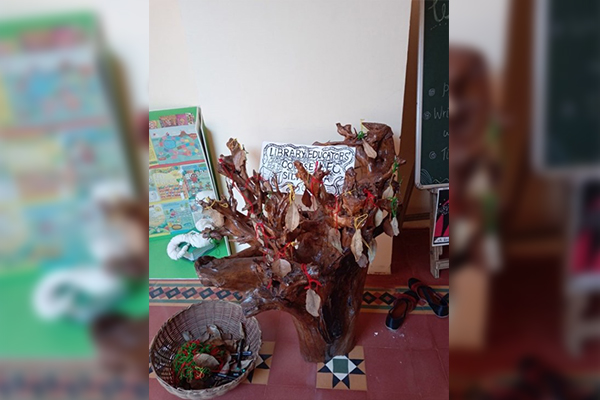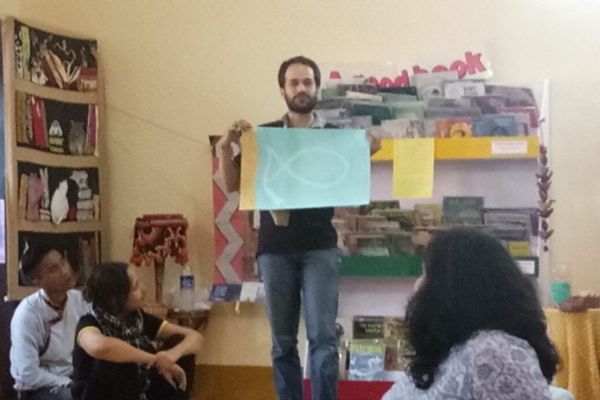
Loading...

Loading...
Written by Lakshmi Karunakaran – LEC English 2018 participant
I saw Ludwig Mies van der Rohe’s aphorism ‘God is in the detail’ come alive as I walked into the LEC 2018 classroom in the St Joseph Vaz Spiritual Centre in Goa. The classroom itself had been converted into a children’s library, with shelves neatly lined up with carefully curated books, categorized and labelled with great precision, tables had been laid out representing different themes with books and selected objects to complement the theme, handmade quilts of bookshelves had been hung to add colour and curiosity, another table had been laid out with stationery and art supplies with much care, secret nooks were created with hidden treasures of special books to be ‘discovered’ by participants, almost serendipitously. The energy inside the room was palpable, it spoke of possibilities. Yet, it all looked like the space had organically grown, rather effortlessly. One look at the space and I knew that this course was going to be very different from any other I had attended before.
The week spent at the contact program has been one of the most enriching. Each day, as the assembly took off, and the sessions started, I was startled by how the course unfolded. Through each reading and discussion, while I learnt about the art of setting up vibrant libraries, I also got a glimpse into the art of putting a good course together. How does one curate the course material? How does one keep the course exciting? How do participants work as a team? How do we read papers closely, ask questions, and open out discussions? How do we use games and play to learn? How do we go back to asking some very basic, yet humane questions about the work that we do? How does the course work, discussion and tasks remain flexible, to where the participants are? How do we link thoughts and arguments from various readings and experience the joy of making sense of it? How can a course become a collective learning experience, rather than an individual rating machine? I found the answers to these and many such questions, unfold before me.
The days were long, starting at eight in the morning and in most cases stretching until midnight as we prepared for the following day with additional readings and discussions. Yet, there was never a dull moment during the day. Each part of the course flowed from one to another, in the same effortless fashion, tailor made, and keeping in mind the godliness in details.
Personally, a few aspects of the course spoke out to me.
Intense Learning Period: Given that we were completely cut off from the outside world, with very little access to internet and mobile network, it allowed me to keep my focus on the course, and dive deep into the process of learning, discovering, sharing and just soaking in. The faculty and mentors were an absolute treasure, and were the backbone of the program. They seemed to walk with us throughout the process, gently guiding us, probing us, and quietly urging us to reflect deeper, and explore answers from within. As a practitioner who does not have an academic background in education, I found the course work to corroborate practices that for me were usually driven by my intuition. This was deeply reassuring, strengthening my faith in my own inner voice. I had not experienced such a hand crafted space for learning in a long time, and I realised how much I missed it.
Quietness and Reflection: In between an intensely busy day, Ashtha Chal brought half an hour of quiet time. It seemed to me like this was the time, that the body and mind took to absorb many unprocessed, sometimes suspended thoughts and reflections that piled up during the day. It was a time for contemplation, as one saw the sun go down and set in the horizon. It brought finality to the day, the stream of thoughts, and helped me to be guided to a space of quietness. Again, given that my meditation practice had taken a backseat for over a year, I found this time deeply nourishing.
A Sense of Community: As someone who works with communities through literature, art and media, I believe strongly in the strength that lies in investing in the collective wellbeing of a community. In a world that is driven by individuality, we are fast losing the sense of the collective that nurtures the principles of equity, participation, self-reliance and social responsibility.
As the week at the course progressed, I saw my belief in the community strengthen. This came from the discussions with fellow participants who came from diverse cultures and backgrounds, but yet in some way believed in a collective goal. During my practice of running libraries, I had many times felt alone. I felt the lack of peers who understood exactly my pains and questions. Finding fellow participants, who were also engaged in similar practices, and quests, was a huge relief.
At the end of the contact program on the eve of the last day, as some of the participants sat to sing songs in the lawn, the cultural diversity within the group became apparent. Songs flowed in different tongues – Kannada, Tamil, Telugu, Malayalam, Bengali, Hindi and so on. At the end, we turned to our friends from Afghanistan, expecting a song in Dari; we requested Jamila to sing the last song of the day. ‘Chalte Chalte Yuh Hi Koi Mil Gaya Tha…’ she sang, to all of our surprise. And it was at that point that I felt, a deep sense of a growing collective within this new community of friends and mentors that I had found.

It has been a week since I am back from LEC and I have thought to share a chunk of my experience I have gathered in my first contact. Before going into the course…

The Week following LEC Contact -1
As soon as I got back from the LEC contact, I tried to capture some of the highlights on that day itself…